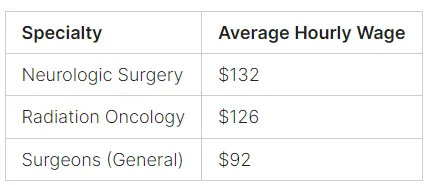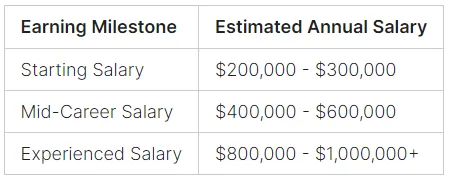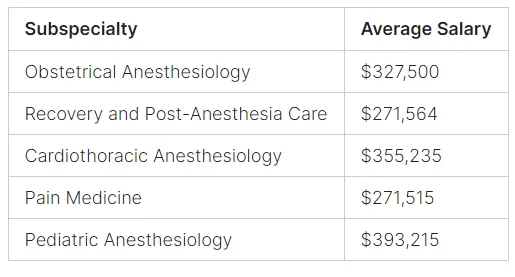Anesthesiologist Salary Determinants (2024)

Author: Cecil Roberts
If you are considering a career as an anesthesiologist, it's important to understand the various factors that can influence your salary. Anesthesiologist salaries can vary depending on several key determinants, including specialty, geographic location, experience, gender, and type of practice. By exploring these factors, you can gain valuable insights into the range of potential compensation in this field.
Specialty is one of the significant determinants of anesthesiologist salary. Specialized surgeons, cardiologists, and anesthesiologists often earn higher salaries compared to general practitioners. The demand for healthcare services and the cost of living in a particular area also play a role. Salaries can differ based on geographic location, with the southern United States generally having the highest salaries in anesthesiology.
Your level of experience as an anesthesiologist is another crucial factor in determining your earning potential. Anesthesiologists with more years of practice tend to have higher salaries due to the expertise they develop over time. Additionally, gender disparities still exist in medicine, with male doctors historically earning more than their female counterparts.
The type of practice and the number of hours worked per week can also impact anesthesiologist salaries. Moreover, benefits packages offered by employers can influence the overall compensation received. It's essential to consider all these factors when planning your career and setting income goals as an anesthesiologist.
Key Takeaways:
- Anesthesiologist salaries can vary based on factors such as specialty, geographic location, experience, and gender.
- Specialized surgeons, cardiologists, and anesthesiologists often earn higher salaries compared to general practitioners.
- The southern United States generally has the highest salaries in anesthesiology.
- Anesthesiologists with more years of experience tend to have higher earning potential.
- Gender disparities still exist in medicine, with male doctors historically earning more than female doctors.
Specialties with the Highest Anesthesiologist Salaries
Within the realm of anesthesiology, certain subspecialties stand out for offering top-tier compensation. Among them, neurologic surgery and radiation oncology lead the pack, providing anesthesiologists with some of the highest wages in the field.

It's worth noting that surgeons in general tend to have higher earning potential within the field of anesthesiology. The average hourly wage for surgeons across different specialties is $92, making it an attractive career path for those seeking financial rewards in the medical profession.
Now, let's take a closer look at the salary comparison between these specialties:

This table provides a concise overview of the average hourly wages for the highest-paying anesthesiologist jobs. As you can see, neurologic surgery, radiation oncology, and general surgery offer excellent compensation opportunities within the field.
Remember, these figures represent average hourly wages and can vary depending on factors such as location, experience level, and individual employment contracts. However, they provide a valuable starting point when considering the highest-paying anesthesiologist jobs.
In our next section, we will explore the impact of geographic factors on anesthesiologist salaries. Understanding how compensation varies across different regions can help you make informed decisions about your career path and desired location.
Related: Tips for Negotiating Anesthesiologist Salary
Geographic Factors in Anesthesiologist Salary

When considering a career as an anesthesiologist, it's crucial to understand how geographic location impacts your potential salary. The earning potential of an anesthesiologist can vary significantly depending on the region, city, or even state you choose to practice in. Analyzing anesthesiologist salaries by location can help you determine where you can maximize your earning potential.
Geographically, the southern United States is known to offer some of the highest salaries for anesthesiologists. Not only anesthesiology, but specialties like invasive and noninvasive cardiology, emergency medicine, gastroenterology, and ophthalmology also tend to have higher salaries in this region. On the other hand, the Midwest United States sees higher salaries for neurology, OB/GYN, and general orthopedic surgery.
In addition to regional differences, there can also be variations in salaries within specific cities or states. Anesthesiologist salary comparison tools can be helpful in assessing the earning potential in different locations. These resources allow you to compare salary ranges and cost of living factors to make informed decisions about your career.
Considering the geographic factors in anesthesiologist salary is crucial for understanding the market value of your skills and expertise. It can also help you make informed decisions about where to practice to achieve the compensation you desire.
Related: Regional Variations in Anesthesiologist Salary
Impact of Experience on Anesthesiologist Salary
Experience plays a significant role in determining the salary of anesthesiologists. As doctors gain more experience in the field of anesthesiology, their earning potential tends to increase. This is attributed to the expertise they develop over time and the opportunities for leadership positions that may arise.
Anesthesiology salary statistics reveal that experienced anesthesiologists often earn higher salaries compared to those who are just starting their careers. Let's explore some key factors that influence anesthesiologist pay scales:
- Years of Experience: Anesthesiologists with more years of experience generally command higher salaries. This is because extensive experience allows them to handle complex cases and make critical decisions with confidence.
- Specialization: Anesthesiologists who specialize in a particular area, such as cardiac anesthesia or pediatric anesthesia, may earn higher salaries compared to general anesthesiologists. Specialized knowledge and skills are highly valued and can lead to better compensation.
- Type of Practice: Anesthesiologists working in different types of practices, such as academic medical centers or private hospitals, may have varying salary structures. The compensation may be influenced by factors such as patient volume, hospital size, and the specific services provided.
- Geographic Location: The location where an anesthesiologist practices can have an impact on their salary. Salaries can vary based on the demand for healthcare services and the cost of living in a particular area. Urban areas or regions with a higher cost of living may offer higher salaries to attract and retain skilled anesthesiologists.
It is important for anesthesiologists to consider these factors when assessing their salary expectations and planning their career paths. By gaining experience and specializing in sought-after areas, anesthesiologists can position themselves for higher earning potential and career advancement.
Average Anesthesiologist Salary by Experience Level

Note: The table above illustrates average salary ranges and may vary depending on several factors such as location, specialization, and type of practice.
Now that we have explored the impact of experience on anesthesiologist salaries, let's dive deeper into other factors that influence the compensation of anesthesiologists in subsequent sections.
Related: Future Projections for Anesthesiologist Salary
Factors Affecting Physician Compensation Growth

Physician compensation growth is influenced by various factors, including specialty, experience, and the rate of income growth over several years. However, one crucial factor that significantly impacts compensation growth is the anesthesiologist job market. Staying informed about the current trends and opportunities in the job market is essential for anesthesiologists to maximize their salary potential.
The anesthesiologist job market plays a significant role in determining the demand for anesthesiologists and the compensation packages offered. By understanding the job market, anesthesiologists can make informed decisions about their career paths and leverage the opportunities available to them.
One way to assess the anesthesiologist job market is by monitoring the average income growth offered in different medical specialties. Some specialties may experience higher average gains in income offers, indicating a greater demand for practitioners in those fields. By exploring these specialties, anesthesiologists can identify areas where they may find better compensation and valuable opportunities for professional growth.

Furthermore, understanding the anesthesiologist job market allows anesthesiologists to anticipate changes in compensation trends and adjust their strategies accordingly. For example, if the job market indicates a growing demand for anesthesiologists in a particular geographic region, anesthesiologists can explore relocation or negotiation opportunities to secure higher salaries.
To stay updated on the anesthesiologist job market, anesthesiologists can rely on various resources such as industry publications, job boards, and professional networks. Engaging in professional organizations and attending conferences can also provide valuable insights into the current state of the job market and potential avenues for salary growth.
Factors to Consider in the Anesthesiologist Job Market:
- Specialties with high demand and better compensation offers
- Geographic regions with favorable job markets
- Compensation trends and growth rates in the anesthesiology field
- Opportunities for career advancement and leadership positions
- Professional networks and organizations that provide job market insights
By keeping a finger on the pulse of the anesthesiologist job market, anesthesiologists can navigate their careers with confidence, maximizing their earning potential and ensuring long-term financial growth.

Note: The above table showcases the average income growth offers in selected medical specialties and serves as a reference for comparison.
Related: Factors Influencing Salary Trends
Gender Disparities in Anesthesiologist Salary

Unfortunately, gender disparities persist in the medical field, including anesthesiology, with male doctors historically earning higher salaries than their female counterparts. This wage gap is a concerning issue that needs to be addressed to achieve pay equity in the field. Advocacy for equal compensation and promoting diversity and inclusion are crucial steps in bridging the gap in anesthesiologist salaries.
It is essential to recognize and challenge the underlying factors contributing to gender disparities in anesthesiologist salaries. Gender bias and discrimination in hiring practices, promotion opportunities, and negotiation processes can all play a role in perpetuating this imbalance.
Efforts should be made to advocate for transparent and fair compensation practices within the field of anesthesiology. By addressing these disparities, we can create a more equitable environment that values and rewards the skills and contributions of all anesthesiologists, regardless of gender.

Furthermore, promoting diversity and inclusion within anesthesiology can help foster a more supportive and inclusive work environment. Cultivating a culture that values and respects the contributions of all professionals, regardless of gender, helps create a more equitable and fulfilling experience for anesthesiologists.
Addressing gender disparities in anesthesiologist salary requires a collaborative effort from healthcare organizations, professional associations, and individual practitioners. By actively working towards pay equity, we can strive to create a fair and inclusive field that recognizes and rewards talent and dedication, regardless of gender.
Related: Average Annual Growth Rate of Anesthesiologist Salary
Other Factors Impacting Anesthesiologist Salary
Apart from the specific factors mentioned above, there are additional elements that can influence anesthesiologist salaries. These factors, such as age, type of practice, hours worked per week, and benefits package, play a significant role in determining the overall compensation received by anesthesiologists.
Age can have an impact on anesthesiologist salaries. As doctors gain more experience and reach seniority, they may command higher salaries due to their accumulated expertise and contributions to the field.
The type of practice an anesthesiologist is involved in can also affect their salary range. Whether they work in a hospital, private clinic, academic institution, or government healthcare setting can determine the compensation they receive. For example, anesthesiologists who have their own private practice may have greater control over their earnings potential.
The number of hours worked per week can also influence anesthesiologist salaries. Some doctors may choose to work longer hours, taking on additional shifts or emergency cases, which can result in higher compensation. It's important to note that working longer hours may also impact work-life balance and overall well-being.
Furthermore, the benefits package offered by an employer can contribute to anesthesiologist salaries. Healthcare professionals often receive benefits such as medical insurance, retirement plans, paid time off, and educational allowances. These additional perks can enhance the overall value of an anesthesiologist's compensation package.
Understanding these additional factors provides a more comprehensive view of the anesthesiologist salary range. By considering age, type of practice, hours worked per week, and benefits package, doctors can make informed decisions about their careers and negotiate fair compensation.
Anesthesiologist Salary Factors:
- Age and level of experience
- Type of practice (hospital, private clinic, academic institution, etc.)
- Number of hours worked per week
- Benefits package offered by the employer
Comparison of Anesthesiologist Salaries by Age and Experience

Related: Anesthesiologist Salary Trends
Conclusion
In conclusion, the salary of an anesthesiologist can be influenced by various factors such as specialty, geographic location, experience, gender, and type of practice. It is crucial for aspiring anesthesiologists to carefully consider these factors when planning their careers and setting income goals. Specializing in lucrative fields such as neurologic surgery and radiation oncology can offer higher earning potential while practicing in regions like the southern United States can provide higher salaries due to the demand for healthcare services.
Additionally, as anesthesiologists gain more experience and take on leadership roles, their earning potential tends to increase.
However, it is important to acknowledge and address the gender disparities that exist in anesthesiologist salary. Advocating for equal compensation and promoting diversity and inclusion can help bridge the gap and ensure fair and equitable pay for all anesthesiologists.
Staying informed about the anesthesiologist job market is also crucial. By keeping up-to-date with trends and opportunities, anesthesiologists can make informed decisions about their careers and take advantage of salary growth potential.
Additionally, understanding other factors such as age, type of practice, hours worked per week, and benefits package can provide a more comprehensive view of anesthesiologist compensation. By considering all these factors, anesthesiologists can navigate their careers and strive for fair and competitive salaries in the field.
Consider wanting a long-term position with your specialty. Anesthesiologists are in high demand as permanent hire physicians. Give us a call at 510.335.2265 to learn more or book a consultation call by using the calendar link here.
__________________________________________________________________________________

FAQ
What are the key factors that affect anesthesiologist salary?
The key factors that affect anesthesiologist salary include specialty, geographic location, experience, gender, and type of practice.
Which specialties offer the highest salaries for anesthesiologists?
Subspecialties such as neurologic surgery and radiation oncology typically offer the highest salaries for anesthesiologists.
How does geographic location impact anesthesiologist salaries?
Anesthesiologist salaries can vary based on geographic location, with different regions and cities offering different compensation levels.
What is the impact of experience on anesthesiologist salary?
Anesthesiologists with more years of experience generally have higher earning potential compared to those who are just starting their careers.
What factors affect physician compensation growth?
Factors such as specialty, experience, and the rate of income growth over the years can influence physician compensation growth.
Are there gender disparities in anesthesiologist salary?
Unfortunately, gender disparities still exist in anesthesiologist salary, with male doctors historically earning higher salaries than female doctors.
What are the other factors that impact anesthesiologist salary?
Additional factors that can impact anesthesiologist salary include age, type of practice, number of hours worked per week, and the benefits package offered by employers.
How can I understand the anesthesiologist job market and ensure fair compensation practices?
Staying informed about the anesthesiologist job market and advocating for fair compensation practices can help address disparities and ensure equitable compensation in the field.
Source Links
- https://www.beckershospitalreview.com/compensation-issues/5-factors-affecting-physician-compensation.html
- https://www.ncbi.nlm.nih.gov/pmc/articles/PMC8320091/

